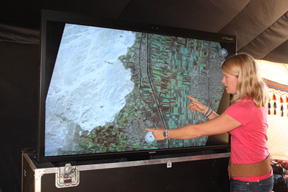A University of Alabama at Birmingham archaeologist has discovered a hidden world in Egypt.
 Sarah Parcak, Ph.D., an Egyptologist and assistant professor of archaeology at UAB, used infra-red satellite imaging to discover 17 lost pyramids as well as more than 1,000 tombs and 3,100 ancient settlements.
Sarah Parcak, Ph.D., an Egyptologist and assistant professor of archaeology at UAB, used infra-red satellite imaging to discover 17 lost pyramids as well as more than 1,000 tombs and 3,100 ancient settlements.
Her discoveries will be revealed in the BBC documentary Egypt's Lost Cities, which airs on BBC One and BBC One HD on Monday, May 30, 2011 – in the United Kingdom. This will not be shown in the United States. The Discovery Channel will air its own version of Parcak’s story with new revelations later this summer.
Parcak’s research was funded by a grant from the BBC in hopes of exploring how satellite imagery can be used in conjunction with archaeology. For more than a year, Parcak’s team used a combination of NASA and commercial satellites that orbited 700 km above the earth to capture the images of Egyptian antiquities. She was able to uncover sites that had been invisible – including a world of houses, tombs and pyramids. Once the images were discovered via satellite, a team of French excavators confirmed what Parcak saw in the images from space.
"I couldn't believe we could locate so many sites all over Egypt,” she told the BBC. "To excavate a pyramid is the dream of every archaeologist."
Parcak worked with Zari Hawass, Ph.D., Egypt’s Minister of State for Antiquities, who was instrumental in her access to the excavation sites, she said.
At Tanis, the site made famous by the Indiana Jones film Raiders of the Lost Ark, Parcak discovered an ancient network of streets and houses, which are completely invisible from the ground.
“This hints at the possibilities of discoveries to come,” she said. “I am excited for my generation and the generations to come. There is enough to be excavated for 50 generations to come.”
This is the first time Parcak has done a discovery on this a large a scale, she said. She also plans to partner with Hawass for training young Egyptians to do this work as well.
“It is important that we map out our ancient history before it’s gone,” she said.
Stay tuned for more details about the upcoming Discovery Channel special.